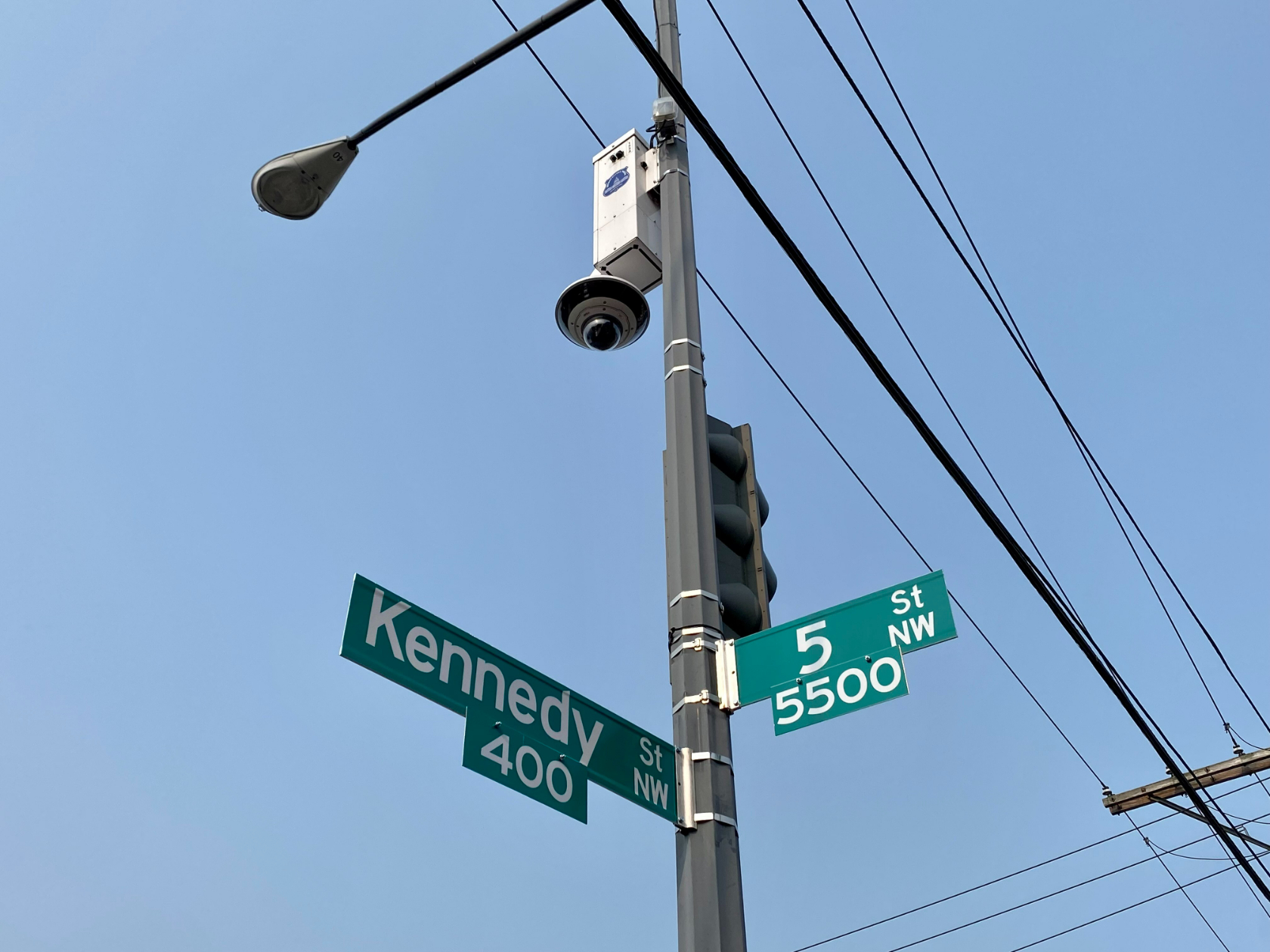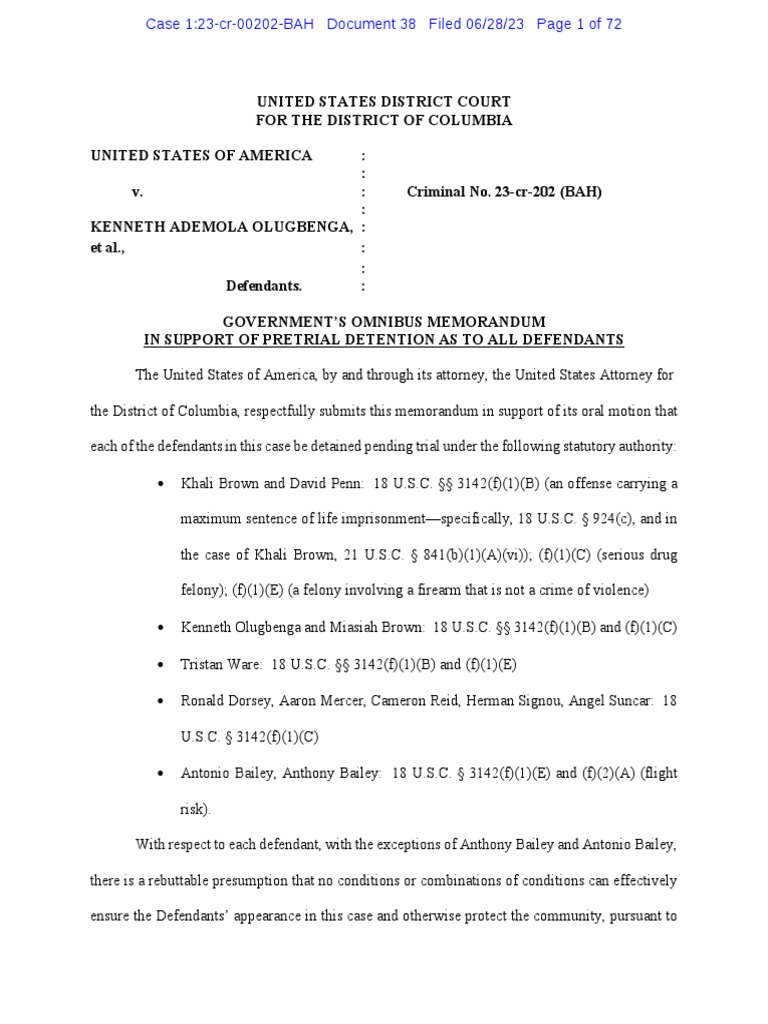BEST ARTICLE
A sweeping indictment claims that a dozen members of the Kennedy Street Crew trafficked hundreds of pounds of drugs and were linked to dozens of shootings.

dcist.com
Prosecutors Indict Alleged Members Of Kennedy Street Crew On Drug And Gun Charges
 Martin Austermuhle
Martin Austermuhle
Residents and businesses along Kennedy Street NW have complained of repeated violent incidents and shootings in recent years.
Martin Austermuhle / DCist.WAMU
Members of a longstanding D.C. neighborhood crew have been accused of trafficking large quantities of drugs into the city, selling them in open-air drug markets in Northwest, engaging in periodic bouts of deadly violence, and laundering the proceeds of their drug sales through a Maryland casino and a nonexistent car-detailing business.
Federal prosecutors this week
unveiled a sweeping indictment against a dozen alleged members of the Kennedy Street Crew, claiming that the men trafficked and sold hundreds of pounds of marijuana, crack, and fentanyl that led to a “marked rise in crimes of violence and homicides in the Kennedy Street neighborhood” — including up to seven dead and many more injured.
The charges and arrests stem from a years-long police investigation into violence and drug sales along a stretch of Kennedy Street NW, running roughly from First Street NW to Georgia Avenue through the neighborhoods of Manor Park and Brightwood Park. The commercial and residential corridor has been the scene of repeated shootings in recent years, prompting police to periodically set up semi-permanent posts at specific intersections. It was also the scene of a
fatal 2020 incident where Karon Hylton-Brown was struck and killed during a police chase; Terence Sutton, the D.C. police officer who was chasing him, was
found guilty of second-degree murder late last year. (He’s appealing the conviction.)
“The Kennedy Street Crew (KDY) operated over an 11-block stretch, trafficking in large amounts of drugs and firearms and possessing numerous firearms in furtherance of its operations. Criminal organizations like this are a magnet for violence,” said U.S. Attorney for D.C. Matthew Graves on Tuesday, when the indictment was made public.
The men charged include
Kenneth Ademola Olugbenga, 27; Khali Ahmed Brown, 22; Miasiah Jamal Brown, 21; Tristan Miles Ware, 23; Herman Eric-Bibmin Signou, 23; Cameron Xavier Reid, 26; Aaron Deandre Mercer, 27; David Penn, 30; Ronald Lynn Dorsey, 29; Antonio Reginald Bailey, 22; Anthony Trayon Bailey, 27; and Angel Enrique Suncar, 29. All but Reid are from D.C., and they face a range of charges covering alleged drug sales, illicit possession of firearms, assault, and conspiracy to launder money.
While the indictment itself only vaguely sketched out the details of what the 12 members of the neighborhood crew are accused of doing, a separate court filing on Wednesday seeking to keep the men in jail pending trial painted a much more detailed picture of the alleged crimes and offered insight into an extensive law enforcement operation that ended up involving D.C. police; the Drug Enforcement Administration (DEA); the Bureau of Alcohol, Tobacco, Firearms and Explosives (ATF); the Federal Bureau of Investigation (FBI); and even the Internal Revenue Service (IRS).
Police and prosecutors allege that members of the Kennedy Street Crew traveled frequently to Los Angeles and returned with large amounts of marijuana; during one interdiction at Dulles International Airport last October, police found almost 200 pounds of marijuana in suitcases allegedly linked to some of the accused. During their investigation, the filing says undercover police officers bought 83 pounds of marijuana, 400 grams of fentanyl, and 224 grams of crack; another 466 pounds of marijuana, 83 grams of fentanyl, and 77 grams of crack were seized during searches.
“Defendants in this case essentially commandeered an entire portion of a local community in D.C. and therein established an open-air drug market,” say federal prosecutors in Wednesday’s court filing.
Prosecutors also say that the members of the Kennedy Street Crew took steps to allegedly launder the money, largely through the MGM casino in National Harbor and a music, entrepreneurial, and car detailing business that “performed almost no washing/detailing services” but paid for $40,000 worth of airfare, restaurants, sports betting, rideshare services, and retail stores.
But prosecutors also allege that the accused were broadly linked to shootings and other violent incidents around Kennedy Street NW, and even as far as Jackson-Reed High School in Tenleytown, where a
shooting took place last November. The court filing says that police seized 40 guns — including eight machine guns — from the crew’s members, and allege that the crew was linked in some form or fashion to homicides and assaults that left seven dead and three dozen others injured. The prosecutors say that at least two of the defendants were also well-known rappers — Khali Brown, known as
Migo Lee, and Tristan Ware, known as
Greedy — and posted music videos on YouTube that showed them holding guns and disparaging members of other crews.
“The KDY crew’s activities and impact on the Kennedy Street neighborhood succinctly evidence the danger inherent in narcotics trafficking, particularly when conducted in conjunction with firearms,” prosecutors wrote. “Over the duration of the conspiracy, there have been nearly 100 instances of firearms-related crimes in the neighborhood, an average of roughly two shootings, per month, for four years. This is notable because the figure does not even account for retaliatory shootings outside of the neighborhood. Put simply, the KDY crew is a driver of the ongoing pattern of cyclical, violent retaliation that exposes the Kennedy Street neighborhood to a significant amount of violence.”
The 12 defendants have been making their initial court appearances this week; those who already have appeared in court pleaded not guilty to the charges they face. Most of their listed attorneys either did not respond to a request for comment or said they currently wouldn’t have any comment to give; one attorney told DCist/WAMU that he was still assessing the specific charges his client is facing.
After the indictment was initially unveiled on Tuesday, Councilmember Janeese Lewis George (D-Ward 4), who represents the area, celebrated the investigation and the arrests. “This is a really important public safety update for our Kennedy Street community,” she
tweeted. “This indictment part of a comprehensive strategy to get guns off the street and hold individuals accountable, while also investing in our communities and supporting our young people.”
Neighborhood-based crews have a long history in D.C., dating back to the late 1980s. Some of the crews, which can cover territory as big as a neighborhood or as small as a block or housing development, develop beefs with other crews, which has periodically led to bouts of violence.
Analyses of city data has shown that many homicides and shootings are
linked to these neighborhood beefs, and police files stolen by hackers and posted publicly in 2021 included insights into how D.C. officials track crews and their members and try and understand their shifting alliances and conflicts. D.C. police operate a database of alleged crew members, which has periodically
drawn criticism over how membership is defined and whether
simply being a member of a crew is linked to crime.
The existence and alleged misdeeds of the Kennedy Street Crew have also led to debates over policing strategies and tactics, which crescendoed in Hylton-Brown’s death during a police chase in 2020. Police later said he was linked to the Kennedy Street Crew, and Sutton’s attorneys unsuccessfully tried to incorporate those allegations in his defense. Sutton is currently appealing his conviction by arguing in part that Hylton-Brown’s alleged links to the crew should have been considered by the jury.



 Martin Austermuhle
Martin Austermuhle



